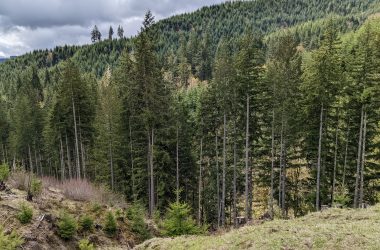The Oregon Department of Forestry needs more and consistent funding to fight wildfires. That much was clear following the 2020 Labor Day fires that burned nearly 850,000 acres of forests and became the state’s most expensive disaster in history.
But lawmakers are split on how to pay for it. Two Democratic senators recently unveiled competing proposals to address long-term wildfire funding. Sen. Jeff Golden, D-Ashland, wants a tax on the value of industrial timber harvests to pay for protection that he says disproportionately benefits private forest owners.
“There is a segment of the timber industry that’s more than able to shoulder more of the load, and when we think about the protection that they get from ODF, they should be picking up more of the baggage here,” Golden said.
Sen. Elizabeth Steiner, D-Portland, wants to charge every property owner in the state an annual fee to pay for what she sees as a statewide issue.
“This is an all Oregon problem now, and that’s different from where we were 10 years ago,” Steiner said.
Both will introduce their proposals during the short legislative session in February. Golden will seek a vote for a ballot referral, which would allow him to avoid a constitutional requirement that three-fifths of the House and Senate approve any new or increased taxes. Steiner will need the three-fifths vote in both chambers for her proposal to pass.
Funding woes
In 2021, the year after the historic fires, the Legislature allocated $220 million for wildfire prevention and response. Two years later, after a couple of mild fire seasons, they approved just $87 million. The part of the budget meant to help Oregonians harden their homes and neighborhoods against wildfires went from $35 million in 2021 to $3 million in 2023.
“It’s very clear to me we are stumbling into the future without an adequate source of funding for wildfire,” Golden said.
Wildfire protection on private land in Oregon is generally split between landowners and the state’s General Fund. But in the case of catastrophic fires, like those seen in 2020, it’s the General Fund that covers the bulk of catastrophic costs. Golden and Steiner say General Fund money is needed for other pressing statewide priorities such as housing and substance abuse response, and both senators want to find other less competitive funding sources for wildfires.
About 30% of the 16 million acres of land that the forestry department protects is privately owned by industrial timber companies, according to Joy Krawczyk, a public information officer with the agency. The rest is owned by ranchers, rural residential homeowners and state, federal and tribal governments, all of whom pay varying fees per acre of land for the department’s fire protection. Between 2023 and 2024, the average per-acre price of that wildfire protection went up 29%, Krawczyk said. Increases were highest for eastern Oregon landowners and grazers, according to Steiner.
Everybody’s problem
Steiner argues that everyone should chip in more for the forestry department’s wildfire fighting budget because wildfires are becoming everyone’s problem.
“It’s an issue that no longer just affects the people in the immediate area of the fire but rather an issue that affects every single Oregonian, one way or another,” she said.
She recently convened a group mainly of large private landowners from around the state, including timber companies, ranchers and the nonprofit The Nature Conservancy, to discuss rising wildfire protection costs on private lands and the concerns of landowners.
This is an all Oregon problem now, and that’s different from where we were 10 years ago.
– Sen. Elizabeth Steiner, D-Portland
Steiner said large landowners in the eastern part of the state are most concerned about the rising per-acre costs of fire suppression. They feel they’re paying a premium for protection that’s more valuable for counterparts in the western part of the state, who have timber holdings worth billions.
But rather than shifting more of the per-acre costs on large timberland owners, Steiner is proposing a “communal” solution: A $10 annual fee added to the 2 million property owners in the state, sending an additional $20 million to the forestry department each year for wildfire suppression.
She also proposes bringing up-to-date for the first time in 15 years two fees that private landowners pay to the state as well as the timber harvest tax. This would bring in an additional $4 million each year. This additional $24 million would allow the forestry department to cut almost in half the per-acre fees forest and grazing landowners pay for their wildfire protection each year.
Sara Duncan, a spokesperson for the Oregon Forest Industries Council, said in an email that Steiner’s proposal is welcome, but that most other Western states do not directly charge private landowners for additional wildfire protection like Oregon does. Other states instead rely more heavily on their General Funds.
“We appreciate Senator Steiner’s thoughtful proposal to address the wildfire funding affordability crisis,” Duncan said in an email. “Currently, Oregon private forest landowners directly pay more for fire protection than in any other state, and will continue to do so under Sen. Steiner’s proposal.”
While other states do rely more heavily or entirely on General Funds for wildfire response on private lands, private landowners in many Western states pay higher property and harvest taxes, and severance taxes, into those General Funds.
They’re not paying for my property insurance, so why should I be paying for theirs?
– Jody Wiser, founder and president, Tax Fairness Oregon
Jody Wiser, founder and president of the nonprofit tax watchdog group Tax Fairness Oregon, said Steiner’s proposal continues a long-term trend of shifting costs from forestland owners to the public.
“They’re not paying for my property insurance, so why should I be paying for theirs?” she asked. “It’s shifting the burden of fire protection off of timber land owners – who already pay extremely low taxes to the state and who have forest products and homes that need protecting – to people who do not.”
Forestland owners as a group paid property taxes last year on less than 17% of their properties’ Real Market Value, according to Tax Fairness’ analysis of Oregon Department of Revenue property tax data. Large portions of private forestland in Oregon are now owned by timber and real estate investment trusts, Wiser added, which do not pay corporate taxes and where investments can be kept in untaxed pension funds.
“These and other large private landowners hold assets worth millions, if not billions, of dollars. They should pay the bulk of the cost of their protection,” she said.
Steiner could not guarantee under her plan that large industrial timber companies would get a discount on fire prevention costs at the expense of all Oregon property owners.
“I really believe this is a communal problem,” she said.
Timber tax
Golden would like a greater portion of forestry’s wildfire budget to come from industrial timber companies with forestland in Oregon. He says these companies disproportionately benefit from publicly funded wildfire protection.
He and Wiser of Tax Fairness point to the financial losses counties and the forestry department experienced when the state’s severance tax was eliminated in 1999. Some of that money was formerly used to fight wildfire, Golden said. To this day, no one in state government or the forestry department can provide a clean figure for how much revenue has been lost since the tax was ended. But, reporting from the Oregonian, Oregon Public Broadcasting and ProPublica found counties lost at least $3 billion in revenues in the three decades since.
Golden said it’s time for private companies that benefit from the forestry department’s firefighting work to pick up a larger share of the cost.
He will propose the Legislature approve a ballot measure to go to Oregon voters. If passed, it would impose a percentage tax on the value of timber harvested on private lands, much like the former severance tax. The tax percentage would be higher depending on the acreage that each company holds, so a small timber operation isn’t paying the same rate as a company like Weyerhaeuser, among the world’s largest international real estate and timber holding companies.
Golden is still working through the details, but he said there would be zero tax for those with less than 500 acres, gradually increasing to up to 6% on companies and individuals holding 5,000 acres or more.
Golden said imposing a timber value tax could bring the forestry department tens of millions of dollars annually for fighting wildfire and responding to threats from climate change. He’d also propose a discount on the timber taxes if a forestland owner gets certification from the nonprofit Forest Stewardship Council. Such certification requires the guarantee that companies will meet certain sustainability requirements.
Ideally, Golden said, he’d like to see 25% of the tax revenues go to the forestry department for fire suppression, another 25% to the state fire marshal’s office to help Oregonians protect their homes and reduce wildfire risks. Another 40%, he said, should be directed for firefighting resources to the counties where the timber is harvested, and the remaining 10% should go to the Oregon Watershed Enhancement Board to help improve drinking water supplies in the Coast Range, where wildfires and logging are posing greater threats to water sources.
Golden said he’s open to feedback and adjustments during the short Legislative session in February, but that lawmakers should not leave that session without a blueprint for a long-term solution to the forestry department’s budget needs.
“The one non-negotiable point is establishing a reliable source of wildfire funding,” he said.
This story originally appeared in the Oregon Capital Chronicle and is republished here under a CC BY-NC-ND 4.0 license. Read more stories at oregoncapitalchronicle.com.






